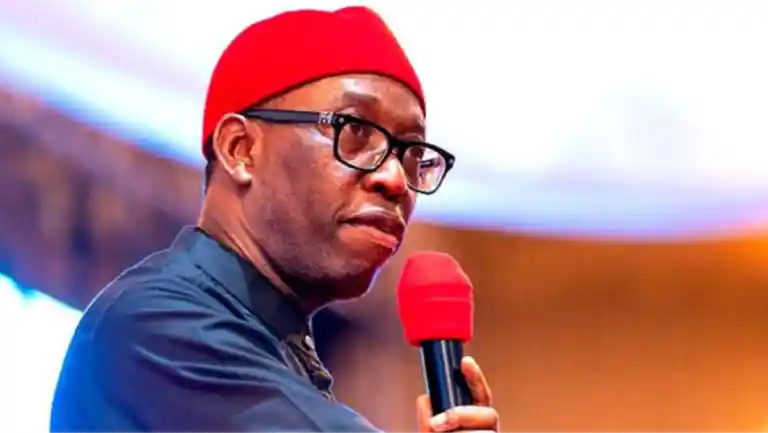I Regret Being Atiku’s Running Mate; Deltans Didn’t Want Another Northerner”: Okowa
- Advertisement -
A former Delta State Governor, Ifeanyi Okowa, has publicly expressed regret for accepting the vice-presidential nomination alongside Atiku Abubakar in the 2023 general election. In a recent Arise TV interview, Mr. Okowa acknowledged that most Deltans opposed the idea of another northerner assuming Nigeria’s presidency after President Muhammadu Buhari’s two terms. His candid admission underscores mounting tensions within the People’s Democratic Party (PDP) over zones of political balance and grassroots inclusion.
Political Background: Okowa’s Rise and Role
Ifeanyi Okowa served two consecutive terms as Governor of Delta State from 2015 to 2023, overseeing key infrastructural projects and social programmes. His tenure was characterized by:
- Advertisement -
- Educational Reforms: Revitalization of the State University and expansion of scholarship schemes.
- Healthcare Initiatives: Establishment of new primary healthcare centres and free maternal services.
- Economic Growth: Promotion of agribusiness and small-scale manufacturing, boosting local employment.
Given Okowa’s popularity in the South-South, his selection as vice-presidential candidate was intended to:
- Balance Regional Representation: Pair a southern Christian governor with a northern Muslim candidate.
- Consolidate Swing State Votes: Leverage Delta’s voter base to bolster Atiku’s ticket.
- Advertisement -
Deltans’ Opposition to a Northern Presidency
Despite the strategic calculations at PDP’s headquarters in Abuja, grassroots feedback from Delta State revealed deep reservations:
- Regional Fatigue: Concerns over the dominance of northern interests following eight years under President Buhari.
- Cultural Sensitivities: Apprehension about cultural and religious divides influencing governance.
- Local Priorities: Desire for more direct southern leadership to address Niger Delta-specific challenges.
- Advertisement -
“Even when we were campaigning, I realized our people were not interested in having another northerner come into power,” Mr. Okowa told Arise TV.
“In retrospect, I now believe I should have gone with the will of my people.”
This frank admission highlights a growing schism between party elites and their constituencies on candidate selection.
The Atiku-Okowa Ticket: Expectations vs. Reality
When the PDP unveiled Atiku Abubakar as its presidential flagbearer and Ifeanyi Okowa as running mate, expectations soared:
- Unified Opposition Front: Aimed at consolidating anti-incumbency sentiments against President Bola Tinubu.
- Cross-Regional Appeal: Bridging the North-South divide to secure a national mandate.
- Policy Synergy: Combining Atiku’s economic expertise with Okowa’s social welfare record.
- Advertisement -
However, the campaign failed to translate these advantages into decisive electoral gains. Analysts attribute the underperformance to:
- Messaging Disconnect: Inadequate articulation of how the duo’s platforms addressed voters’ immediate concerns.
- Intra-Party Friction: Visible disagreements among PDP leaders over zoning principles.
- Voter Apathy: Disillusionment following past power-sharing arrangements.
Defection to the APC: Motivations and Reactions
Shortly after airing his regrets, Mr. Okowa formally defected from the PDP to the All Progressives Congress (APC). He stated that the move was driven by a commitment to Delta State’s development, arguing that:
- Federal Alignment: Joining the ruling party would facilitate access to Abuja’s budgetary allocations.
- Resource Mobilization: Better opportunities to implement long-delayed projects in education and healthcare.
- Political Stability: Positioning Delta’s leadership for smoother collaboration with the federal government.
In his farewell address to PDP members in Asaba, Okowa emphasized service over partisan loyalty:
“My people’s needs must come first. If realigning politically advances Delta’s prosperity, then that is the path I must take.”
Atiku’s Official Response
Atiku Abubakar responded to the defection with characteristic statesmanship, releasing a statement that underscored democratic norms:
- No Grudges: “I bear no ill will toward anyone exercising their right to political alignment.”
- Political Realities: “Defections, alliances, and realignments are part and parcel of democratic politics.”
- 2027 Perspective: Framed the next election as “Nigerians versus an administration that has plunged the nation into untold suffering.”
Atiku’s measured response suggests that the PDP remains focused on recapturing momentum ahead of the 2027 polls.
Implications for the 2027 General Election
Mr. Okowa’s defection and candid critique of the 2023 ticket could reshape strategic calculations for both major parties:
- For the PDP:
- Zoning Reconsideration: Renewed debates on whether to rotate the ticket between zones or prioritize electability.
- Grassroots Engagement: Need for deeper consultation with state chapters on candidate selection.
- Image Rehabilitation: Overcoming perceptions of top-down decision-making.
- For the APC:
- Southern Inroads: Opportunity to solidify support in the South-South region ahead of 2027.
- Policy Leverage: Ability to showcase federal projects in Delta State as proof of governance dividends.
- Intra-Party Dynamics: Balancing the interests of longstanding APC elites with newly acquired defectors.
Political analysts warn that defections alone will not guarantee electoral victory. Both parties must articulate clear, actionable agendas on the economy, security, and social welfare.
Expert Commentary
Dr. Nneka Eze, Political Scientist, University of Lagos
“Okowa’s public regret is a double-edged sword: it highlights the centrality of zoning in Nigerian politics but also exposes a lack of internal democracy within parties. For the PDP to recover, it must empower state chapters and respect grassroots preferences.”
Mr. Ahmed Suleiman, Governance Analyst, Abuja
“Defection is a hallmark of our fluid political landscape. What matters now is whether either party can convert alignment shifts into policy achievements that resonate with voters.”
What you should know
Ifeanyi Okowa’s admission of regret and subsequent defection underscore the enduring complexity of Nigeria’s zonal arrangements and the pivotal role of public sentiment in electoral politics. As the nation looks toward 2027, both the APC and PDP must heed these lessons—prioritizing inclusive decision-making, transparent candidate selection, and tangible policy deliverables to win the confidence of a discerning electorate.
- Advertisement -


